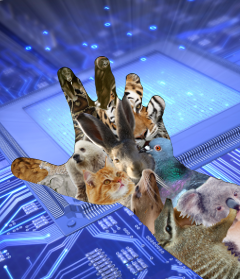Species splicing supported
 A leading expert has reflected on the ethical concerns of mixing human and animal DNA.
A leading expert has reflected on the ethical concerns of mixing human and animal DNA.
Bioethics researcher Dr Insoo Hyun says we must be able to mix-and-match species to develop new treatments.
He argues that the world needs a new bioethical framework for addressing concerns surrounding potentially revolutionary research on human-animal embryos.
Human-animal embryos, called chimeras, can be produced when human stem cells are transplanted into animal embryos.
These types of embryos can be used to grow human organs in large animals, such as pigs and sheep, to help ease the chronic shortage of human organs available for transplantation.
This research could also be used to study the causes of many human diseases, but the use of the human cells in this kind of work remains controversial.
Last September, the UK’s National Institutes of Health imposed a moratorium on funding the research in response to ethical concerns (private funding was unaffected).
In early August, the NIH announced plans to lift the moratorium after a 30-day comment period on proposed regulations that called for heightened review of the research, under certain conditions.
But Dr Insoo Hyun argues that most of the concerns, if not all, tied to such research can be reasonably addressed in a way that prioritises animal welfare while enabling scientific progress to help patients who need organ transplants.
While some researchers and bioethicists worry that a developing animal with a human organ could attain something like human moral status, especially if the central nervous system is involved, Hyun argues that these concerns - while understandable - are overstated.
The appearance of human-like self-consciousness is needed to elevate the moral status of a research animal, but this distinctive psychological characteristic is not likely to emerge in a chimeric animal’s brain, Hyun says.
Instead, the much more likely outcome of neurological chimerism is an increased chance of animal suffering and biological dysfunction and disequilibrium, if past experience with transgenic animals can serve as a guide.
“This is why,” says Hyun, “focusing on animal welfare principles is crucial.”
Hyun’s arguments reflect the ethical standards for chimera research established by the Ethics and Public Policy Committee of the International Society for Stem Cell Research, which he helped develop.
His full view is detailed in an opinion piece in the new edition of PLOS Biology.







 Print
Print